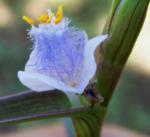Latin name
Cyanotis axillaris (L.) D. Don
Family
Commelinaceae
Synonym(s)
Amischophacelus axillaris (L.) Rolla Rao & Kammathy
Geographical distribution
Asia: China.
South and Southeast Asia: Australia, India, Indonesia, Malaysia, Philippines, Sri Lanka, and Thailand.
Rest of the world: Africa (Eastern).
Morphology
A branched prostrate or sub-erect, fleshy annual, rooting at the nodes.
Stem: round, pinkish, and procumbent; about 5 mm—thick, 20—40—cm—long.
Leaf: lanceolate or linear, 4—11—cm—long and 0.6—1.2—cm—wide, glabrous upper surface; sheathing at the base, clasping the stem, and ciliate with long hairs on margins.
Inflorescence: purple or blue flowers in axillary clusters, partly hidden by the leaf sheaths; petals 3 and long with claws being united into a tube.
Fruit: capsule, beaked at the top.
Seed: grayish and pitted, 2 in each cell, truncate at base with a small conical point at the top.
Biology and ecology
Cyanotis axillaris is found in paddy and damp places. It can reproduce vegetatively and by seeds
Agricultural importance
It is a potential seed contaminant.
Management
Cultural control: uproot plants and bury them; ensure clean seed or seedlings.
Selected references
Backer CA, Van Den Brink RCB. 1968. Flora of Java (Spermatophytes only). Vol III. Wolters-Noordhoff N.V., Groningen. The Netherlands. 761 p.Digital Flora of Taiwan. www.eFloras.org.Cyanotis axillaris. www.bpi.da.gov.ph/Publications/mp/pdf/s/sabilau.pdf.Noda K, Teerawatsakul M, Prakongvongs C, Chaiwirtnukul L. 1984. Major weeds in Thailand. National Weed Science Research Institute Project. Japan International Cooperation and Department of Agriculture Bangkok, Thailand. 142 p.Pancho JV, Obien SR. 1995. Manual of ricefield weeds in the Philippines. Munoz, Nueva Ecija (Philippines): Philippine Rice Research Institute. 543 p.Tadulingam C, Veenkatanarayana G. 1985. A handbook of some South Indian weeds. Coimbatore (India): Madras Agricultural College. 356 p.
Contributors
JLA Catindig, RT Lubigan, and DE Johnson
